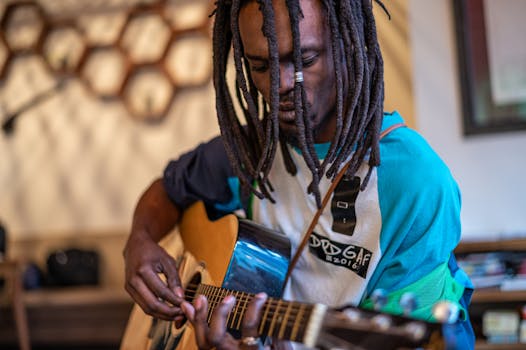Reggae Music, its Roots and Culture

Reggae music transcends musical classification; it embodies a diverse cultural tapestry interwoven with historical narratives, challenges and resilience. Emerging from Jamaica during the 1960s reggae has evolved into a global force leaving its mark on various music genres and societal movements. Its unique beats and profound lyrics resonate deeply with audiences serving as a timeless emblem of harmony, affection and togetherness.
The origins of reggae can be traced back to the streets of Kingston, where trailblazers like Bob Marley, Peter Tosh and Bunny Wailer pioneered a sound that would soon capture hearts worldwide. By blending Jamaican melodies with elements of jazz, R&B and rocksteady these visionaries crafted a distinct sonic identity characterized by its syncopated rhythms and socially conscious verses. This innovative musical expression swiftly gained acclaim both at home and abroad.
Beyond its melodic essence lies a broader narrative of culture and selfhood. The movements reverence for African heritage and spiritual enlightenment significantly influenced reggaes thematic essence and visual aesthetic. The messages of emancipation, equality and resilience conveyed in reggae compositions mirror the trials endured by marginalized communities in Jamaica and, across borders. The strong bond between music and social issues has turned reggae into a tool for promoting causes and sparking change.
The Growth of Reggae Music
Reggaes journey from its roots in Jamaica to becoming a phenomenon showcases its broad appeal. During the 1970s and 1980s reggae started influencing music styles worldwide. Renowned artists such as Eric Clapton and The Clash integrated reggae beats into their music introducing it to audiences. Simultaneously reggae festivals began emerging in regions like Europe and the United States strengthening its presence on the stage.
A pivotal moment in the evolution of reggae was the emergence of music in the late 1970s. While retaining elements of reggae dancehall introduced quicker rhythms and more electronic sounds. This fresh approach resonated with listeners helping to keep reggae relevant amidst changing musical trends. Dancehall icons like Shabba Ranks and Beenie Man rose to fame popularizing reggae in clubs and on dance floors
Notable Figures in Reggae Music
Any conversation about reggae would be incomplete without acknowledging Bob Marleys impact on the genre. Marleys music transcended boundaries of race, nationality and faith elevating him to a symbol, for peace and solidarity. Songs such as "One Love" and "No Woman, No Cry" continue to inspire people of all ages after his passing.
Peter Tosh and Bunny Wailer, who were members of The Wailers with Marley are also recognized figures in the music scene. Their individual careers have added depth to the genre by conveying messages of strength and empowerment. Today artists like Damian Marley, Bob Marleys son carry on the reggae legacy while exploring boundaries.
The Influence of Reggae Culture
Reggae has not left its mark on music but has also influenced fashion trends, language usage and lifestyles worldwide. The iconic dreadlocks associated with culture have become a symbol of reggaes influence. Additionally Patois, a creole language often found in reggae songs has spread its unique expressions globally.
Furthermore reggae has been instrumental in promoting awareness. Its themes of equality, justice and solidarity resonate with individuals advocating for change or facing injustice. Reggae concerts frequently serve as platforms for activism by shedding light on issues like poverty, human rights violations and environmental concerns.
Global Presence of Reggae Music
Today reggae music thrives across continents. In Africa artists like Lucky Dube blend African sounds, with reggae rhythms to create a distinct fusion that represents their cultural heritage. In Latin America bands like Gondwana from Chile have introduced the soul of reggae to Spanish speaking audiences.
| Region | Notable Artists/Bands |
|---|---|
| Africa | Lucky Dube |
| Latin America | Gondwana |
| Europe | UB40 |
| North America | Slightly Stoopid |
| Asia | Mighty Crown (Japan) |
The Future of Reggae Music
The future of reggae appears bright as new talents emerge while paying homage to its heritage. With the rise of platforms such as YouTube and Spotify upcoming musicians can easily showcase their creations to a global audience. Collaborations among artists from genres also contribute to keeping reggae innovative and captivating.
Moreover festivals dedicated to celebrating reggae culture continue to flourish. Events like Reggae Sumfest in Jamaica or Rototom Sunsplash in Spain draw crowds of fans annually uniting them for the love of music and shared values that transcend boundaries.
In summary reggae music stands strong as a medium for cultural expression and social transformation. Its origins deeply rooted in history have spread across continents, touching souls everywhere with rhythms that move your body or lyrics that ignite your spirit, towards justice and unity! The lasting charm isn't in its catchy tunes but also in the messages that strike a chord with everyone. A gentle nudge towards the strength we discover in our common humanity and our joint yearning, for a brighter future!
